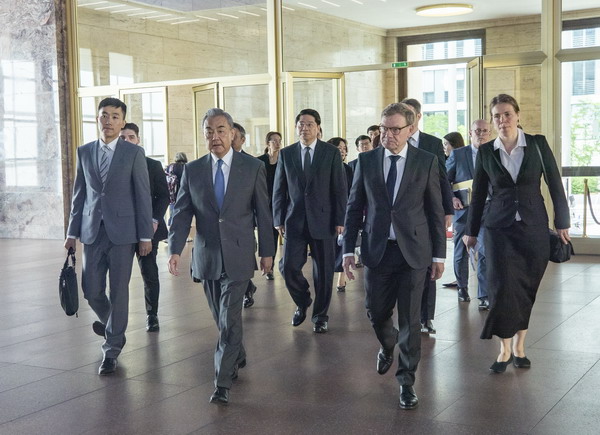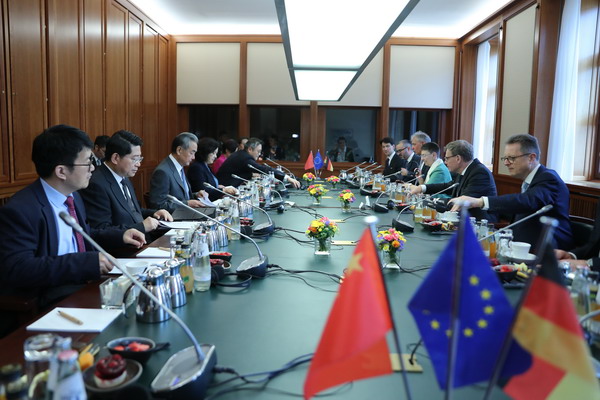
People’s Republic of China


On July 3, 2025 local time, Member of the Political Bureau of the CPC Central Committee and Foreign Minister Wang Yi held the eighth round of the China-Germany Strategic Dialogue on Diplomacy and Security with German Foreign Minister Johann David Wadephul in Berlin.
Wang Yi said that this year marks the 50th anniversary of the establishment of diplomatic relations between China and the European Union (EU), and the China-Germany all-round strategic partnership has also embarked on a new decade. China-EU and China-Germany relations have reached a critical juncture of building on past achievements and opening up the future. A sound China-Germany relationship will not only drive the overall development of China-EU relations but also bear great significance for global stability and development. As the world's second and third largest economies, China and Germany shoulder important international responsibilities and carry the expectations of various parties. The two sides should work hand in hand to reaffirm mutual trust, further consolidate bilateral cooperation, and deepen bilateral relations. In the face of the current turbulent international situation marked by rising protectionism, de-globalization, unilateralism and bullying acts, China and Germany need to enhance strategic communication and coordination to contribute greater certainty to the world by building on the stability of bilateral relations, jointly advocate and practice multilateralism, uphold the international system with the United Nations at its core, the international order underpinned by international law, and the basic norms governing international relations based on the purposes and principles of the United Nations Charter, and remain committed to developing a more reliable, stable, and predictable all-round strategic partnership.
Wang Yi stated that not long ago, President Xi Jinping had a phone call with Chancellor Friedrich Merz, charting the course and setting the tone for the development of China-Germany relations in the next stage. Despite changes in the international landscape, China-Germany relations have maintained steady development. The most important experience is the commitment to mutual respect, seeking common ground while shelving differences, and pursuing win-win cooperation, which constitutes the fundamental logic for the sustained development of China-Germany relations. Given the differences in history, culture, and social systems between China and Germany, it is natural that divergences exist. The key is to enhance understanding and mutual trust, and view differences in a calm and rational manner. The Chinese side places China-Germany relations in an important position in China's diplomacy and appreciates the new German government's positive and rational attitude to developing relations with China. Wang Yi expressed the hope that Germany will support China's efforts to achieve complete national reunification just as China unconditionally supported Germany's reunification, and strictly abide by the one-China principle. As a core major country in the EU, Germany has made active efforts to the development of China-EU relations. Wang Yi also expressed the hope that Germany will continue to play a constructive role in the development of China-EU relations.
Johann David Wadephul said that Germany is willing to work with China as mutually trustworthy and predictable cooperative partners. In this era full of crises and challenges, it is crucial for Germany and China to maintain close communication and cooperation. With a long history of exchanges and a sound foundation for partnership, the two countries share common ground on many issues and are able to properly handle disagreements and differences with mutual respect and in a constructive manner. Germany looks forward to enhancing communication and exchanges and continuously strengthening bilateral cooperation with China. The German government firmly adheres to the one-China policy.
The two sides also had an in-depth exchange of views on the Ukraine crisis, the Iranian nuclear issue, the situation in the Middle East, and multilateral strategic cooperation. Both sides agreed to continue maintaining close communication and coordination to work for the ceasefire and cessation of hostilities as well as peaceful settlement of disputes.




